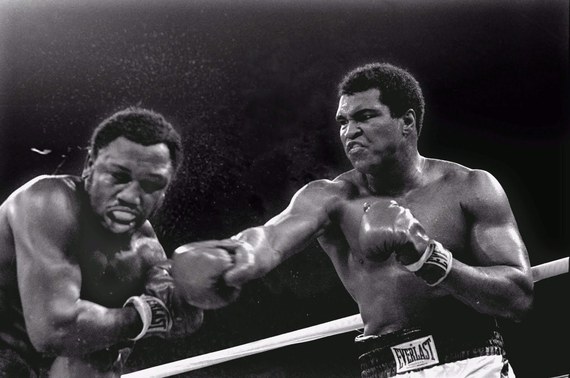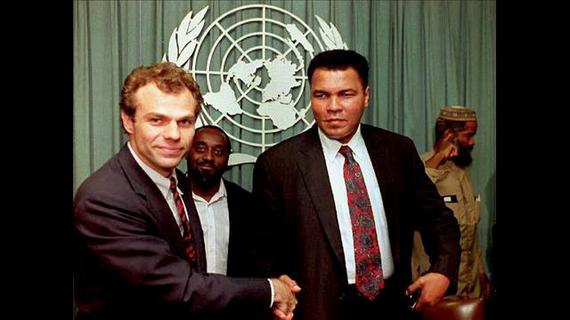Muhammad Ali and Joe Frazier met in the boxing ring, but their battle was the bigger clash of politics and cultures, of the new and the old. It was held in New York City's Madison Square Garden with celebrities eager to be seen as relevant by attending the spectacle, from Frank Sinatra to Diana Ross. This weekend's fight between Floyd Mayweather and Manny Pacquiao has been hyped as the "Fight of the Century," and it is the largest purse ever offered, but it cannot compare to the clash between the two undefeated champions who stepped into the ring at a time of tremendous turmoil, change and drama that engulfed America and the world on March 8, 1971.
Ali, the undisputed champion of the world, had been stripped of his crown by the politics of banishment after he refused induction into the U.S. military. He had also risked long jail time, not like Mayweather for domestic violence, but for daring to take an early stand against the the Vietnam War, the U.S. government's narrative of such conflict as well as the draft. Ali could have opted to be inducted into the U.S. Army, face no combat risk and continue his lucrative boxing career. Ali and his supporters (Malcolm X most prominently) though had opted to employ the opportunity to send a political message regarding the racism that still pervaded much of the U.S. political and cultural environment in the mid 1960s as well as oppose a war without clear national imperative strategically or morally.
The antagonism displayed toward Muhammad Ali though went beyond politics or race. Cassius Clay had become a Muslim and changed his name in part to reassert the identity painted over by centuries of slavery. Worse, Ali adopted a high profile, proclaiming himself "The Greatest" in the ring, and espousing confident, even boastful, quadrants regarding his boxing talent and proclaiming the demise of his opponents. Ali was the original, before any U.S. athletes dared intimidate or celebrate victory. Ali was seen by many as not only lacking humility but unthankful to whatever powers had crowned him with title and wealth. It is hard today to see how many people then hated Ali, wished him to be killed in the ring (or outside of it.) The Ali that appeared before America and the globe at the Olympic Opening Ceremonies in 1996 at the Atlanta Games demonstrated that he had prevailed in style and substance in the hearts and minds of global citizens and the newer generation of fellow Americans. (Today, after 9/11 and the purported clash of religions, some may be inclined again to project difference as basis for enmity or at least disrespect.)
Joe Frazier was no less the champion, also undefeated in Ali's absence. However, it was this hardworking and talented boxer's misfortune to be associated with the establishment, and the outdated. As Frazier was still formidable in the ring, he looked as someone swimming against the tide of history outside of it. Even for those who hated all black men, they wanted this black man to be their instrument of destruction, in demolishing the other, Ali.
The animosity and clash of ideals and politics layered itself upon the already combative relationship between the personality opposites that Ali and Frazier were. The bitterness never wore off particularly for Frazier who felt caricatured. However, the respect for each other as boxers and gladiators was always evident and even profuse after their combat in the ring. Despite the life damaging punishment that each endured at the fists of the other, they did not hesitate to meet again in the ring, a total of three memorable bouts. Ali and Frazier never hesitated to also take on the challenge of other greats of their era, including the seemingly invincible George Foreman, from whom Ali recaptured the title.
Mayweather has avoided the fight of the last decade to fight Pacquiao in this one for a bigger pay-day. That may be good business but not great boxing. And what about Mayweather's greater contributions? He claims to be greater than Ali, but thanks Muhammad and Sugar Ray Robinson for "paving the way" for him. Mayweather might be riding to the fight in the back of the bus if not for those who opted for courage over self-enrichment, including Ali, MLK, Malcolm X and the woman with the biggest punch in the gut of racism, Rosa Parks. (See: "Sports Stars Beyond Caricature to Freedom of Expression.")
When I met Ali as a young teen in Cleveland, he offered only respect to Frazier as an opponent, and no resentment for his 1971 loss. In 1972, Ali offered me an autographed photo, with added admiration to his co-religionists in then-Yugoslavia. Two decades later, we would once again meet at the United Nations when Muhammad Ali came to visit with me as Bosnia & Herzegovina's Ambassador during a time of great travail and suffering in the country that I then represented. He was already then impacted in his speech by the Parkinson's that has invaded the life of a boxer that perhaps evidenced as much courage in the ring as unbounded talent. Ali was generous with his time and efforts to evidence his solidarity with those being tested at the time with aggression, war and genocide. Ali was fully intellectually engaged even as Parkinson's had robbed him of much of the verbal adornment that had characterized his public life. He was humble recognizing the irony that "the Greatest" had been made silent by an act of nature. He was not humbled but I believe as always was humble in the presence of a greater authority beyond the reach of any man.
Ali, as I have in a more modest fashion, traveled a journey that helped define us and the world around us. In 1971, I had gone to watch that battle in a crowded Cleveland theater, the then version of "pay-per-view," but the difference was you could not choose who you invited to sit next to you, an Ali supporter or one who rooted for Frazier to destroy him. In 1992, Ali at the UN was a great American, a Bosnian and the first of many who recognized within them the global citizen, an identity and destiny shared by all of us. Before then though, Ali fought in the ring and beyond, "The Greatest Fight of (that) Century" or any other!
@MuhamedSacirbey
PHOTOS: Huffington Post fishduck.com and personal collection

